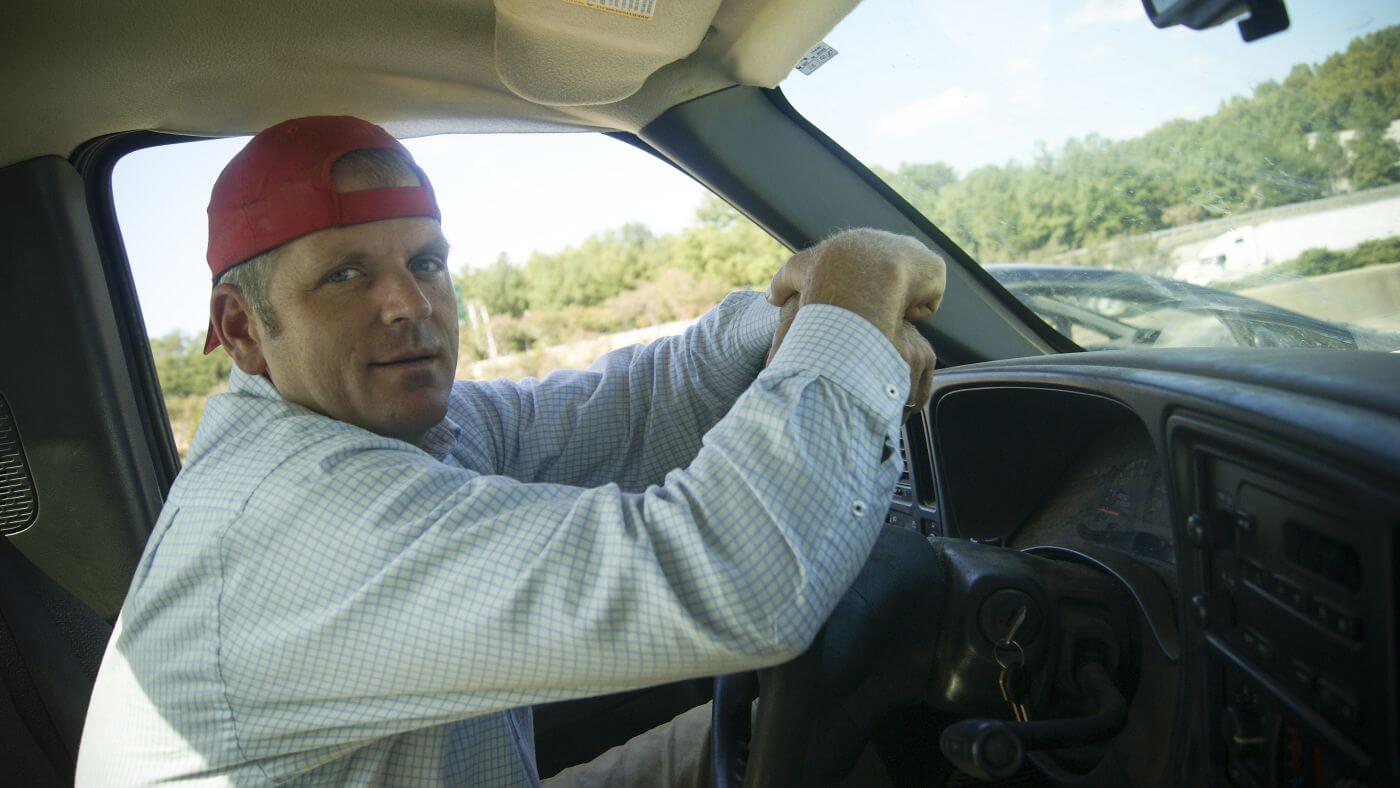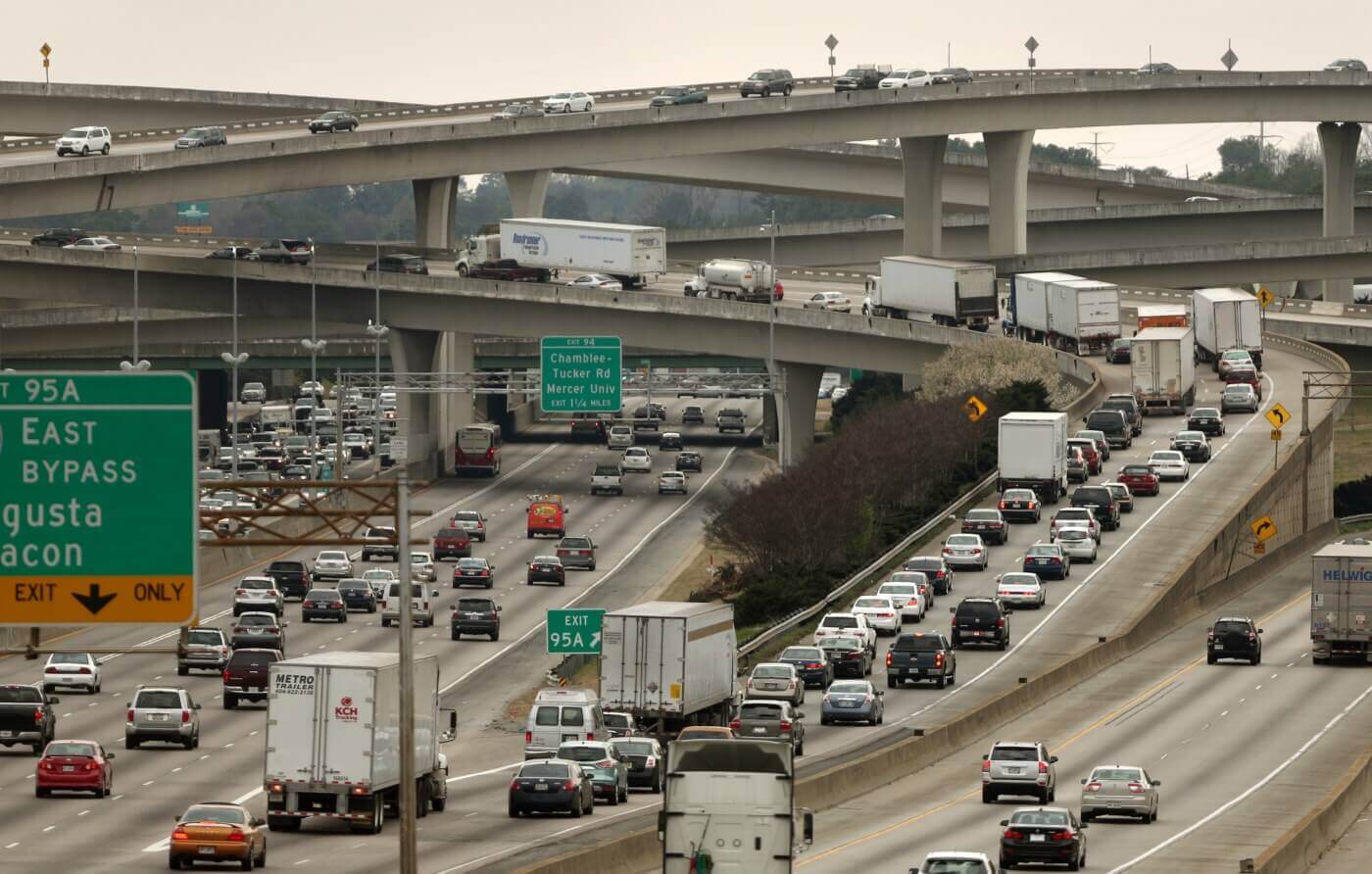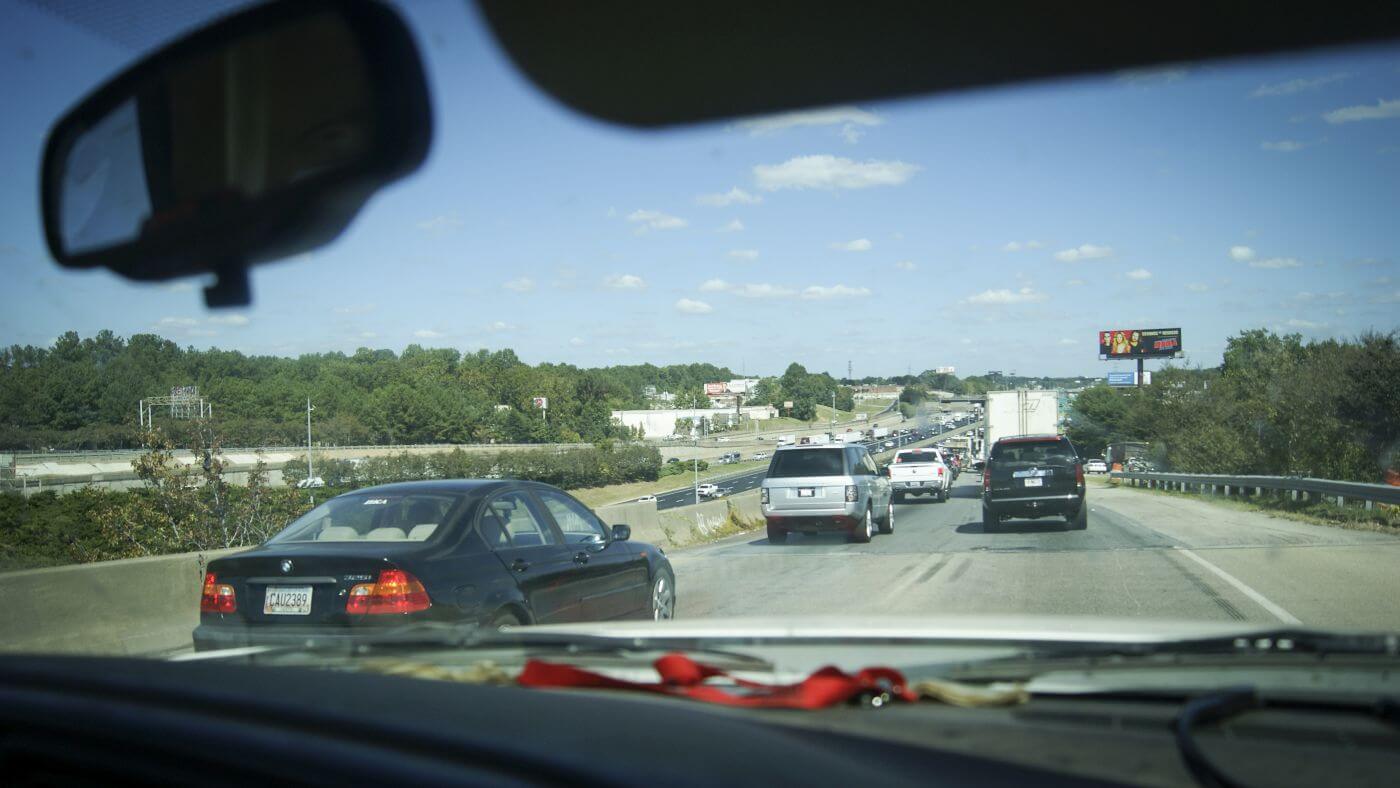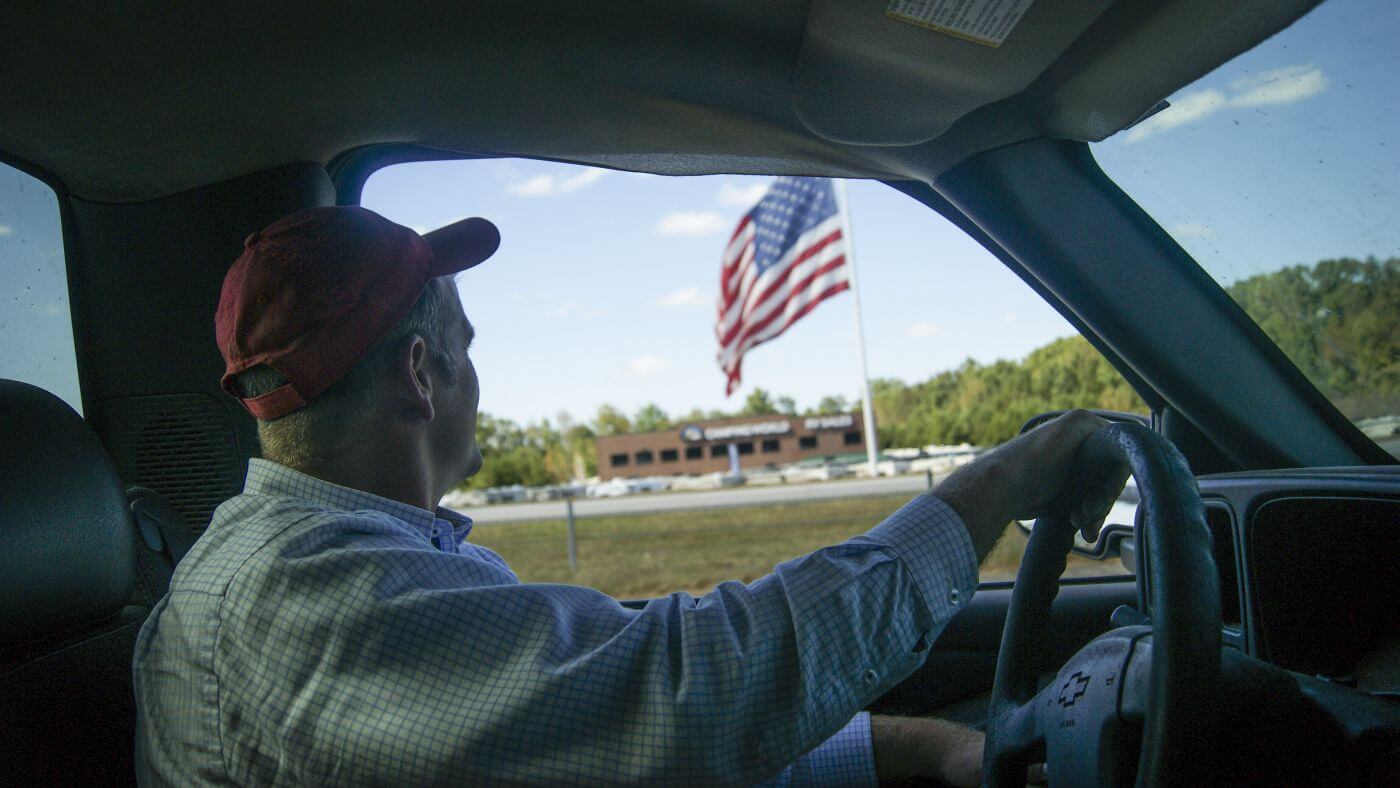Our reporter, Dawid Krawczyk, flew to the southern American state of Georgia to better understand the people who pushed Trump to the presidency. Who are these people? How do they imagine their future? Is Trump’s America the country of their dreams? And most importantly, what caused pious southerners to vote for a bombastic Northerner?
Explore the answers in the fifth and the last chapter of this Political Critique series.
I.
II.
III.
IV.
I just know that I’m a good candidate – they got nothing on me
V.
It’s morning and Matt is waiting for me. “Come on. We’re in a hurry. Actually, we’re almost late already,” he says. He shifts into gear and we take off. Clean shave and wearing a freshly ironed green and white checkered shirt, Matt is giving a sign that there is an important meeting on the schedule today. “It may be even the most important one in my whole career,” he says and then describes in detail who is we’re going to meet, but stipulates that it’s off the record and I can’t publish anything about it.
Two hours later, we’ve finished. We’re in the car, but Matt’s thoughts are clearly still on the meeting. We enter the Interstate 285 when finally, he lets go and orders me to turn on the recorder, so he can tell me “everything I have to know.”

“Matt, but tell me honestly, how does Trump relate to anything you told me at the diner: family values, Christian upbringing, mercy? He is a billionaire from New York who boasts about grabbing women by the pussy.”
“Firstly, Trump is our president and it was a good decision to elect him,” he answers dead serious. “Secondly, he is a man. Every man is torn apart between having a family, kids, safety and looking for… I don’t have to tell you looking for what, right? And finally, Donald Trump is just a…,” he looks for a good word. “He is a vehicle, who is realizing our goals, our mission, so far. He is making the American volk stronger!” Matt raises his voice and stresses the last words with a German accent.
We’re climbing the highest point of Spaghetti Junction (technically it’s Tom Moreland’s Junction, but no one calls it that). It’s one of the most complicated junctions in the world. Interstate 85 and 285 meet here in this concrete tangle with the State 23 and 13 – five levels, each road wide for a couple of lanes. There is something very 20th century and late 80s in its construction from; raw brutalism and surrealism of Atlanta traffic reminiscent of Luc Besson’s Fifth Element.

As I was told by locals there is nothing more Atlanta in Atlanta than being stuck in the traffic somewhere in the enormous highways that ring the metro area. You could make it even more Atlanta and try to end the trip at one of the many city’s strip bars, but as far as I know, we’re on our way to meet “the real America.”
“Volk?” I’m asking, not really getting why he is putting up this strange German accent. Or I’m just successfully lying to myself that I don’t get it.
“I explained it to you last time we met. Volk is that part of America that loves this land and is ready to defend it at all cost. Vaterland! (German accent again) Fatherland! Volk is all that people who didn’t forget about the Christian values of this country and who oppose all kind of socialists. Evangelical Right,” Matt enumerates and I’m trying to find how does it relate to Trump’s campaign.
“And when you worked for the Trump campaign, did you meet a lot of that kind of America?”
He goes quiet.
“We weren’t supposed to discuss my work for Trump, you remember?” he replies absolutely serious. I say that maybe it will help if I turn off my recorder. “Don’t push,” he ends the negotiations.
We drive for a while in a particularly awkward silence. “Tell me, how is it possible you know your English so well? How did you know we call this junction ‘spaghetti junction’? They’ve just sent you for two weeks to Georgia?” Suddenly, I’m caught in this crossfire of questions that do not make the atmosphere in the pick up any less awkward. I reply to each question and propose to change the topic and talk about that “liberal colleges filled with socialists.”
“Matt, can you tell me more about college in the US? You keep saying that only thing they do is brainwashing students, but you graduated from college and you’re not a socialist, right?”
“Oh, but what I had to live through. At the very beginning of my studies, I had a literature class. I open the book. And you know what it was? Gay pornography. Homosexuals,” Matt recollects with a visible grimace on his face. “When I told them, I’m not going to read that filth, they replied that I don’t have to, but I will have to pass an exam. I changed colleges.” The list of grievances Matt endured from college staff is impressively long. We drive and I listen to this layer cake of blasphemies and socialism. One professor told them to forget about God and the Ten Commandments, another one disdained the intellectual potential of Matt’s paper on Lenin and Stalin. “I focused on how important education was for communists. They always wanted to use it to fight with God and to win people’s minds. I got a really bad grade. It wasn’t a grade for a paper, but for my beliefs,” Matt gets frantic. “Anyway, we are in the country! Can you feel that? You’ll see how friendly people are here. They speak a bit differently, like ‘How you’all doin’?’, so it’s even hard to understand sometimes, but it will be alright,” Matt cheerfully turns the volume up of the country music in his car and drive towards Gainesville, north to Atlanta.
I’m trying to order all these dates and stories, time at colleges, campaign work. “Matt, I haven’t asked you yet, how old you are,” I say. His face stiffens. He looks at me inquiringly, in silence.
“Who are you anyway? You want my social security number, too?” he shots a round of questions at me. “You’re a scam artist. Scam artist! You’re a scam!” he’s almost screaming at me at this point. I have to look really puzzled because I honestly didn’t expect this plot twist.
We park at the gas station and Matt tells me to get out of the car. A couple of rickety gas pumps and a dusty shop. I check the GPS location on my phone. It’s Oakwood, Georgia – a couple of minutes drive from the Lake Lanier.
“Do you have a passport? ID card? Show me some papers,” Matt orders me. Just a while ago he was praising “Southern Hospitality”. Maybe that’s the only reason I’m not going through this passport control being held at the gunpoint.
I take out my passport and press ID. I told him about my previous trips to New York, so now I can back this with the stamps I got at the customs. Two visas, the touristic and journalistic one. I even propose he can make a call, to whoever he’d like to – to my magazine’s office, to Border and Customs control, even to the Police.
He takes a photo of the press credentials. And when we sip the Gatorades bought on the station he says that he’s sorry, and that scam thing was just a joke. “You don’t even know how many foreigners come here to take advantage of our hospitality. It was a joke, sorry, just a joke. Come on, put on this T-shirt and let’s get to work.”
I put on a navy blue T-shirt. Big white letters: TRUMP-PENCE, a couple of white stars and below the legendary “Make America Great Again”.
***
The first house is just a few hundred meters from the gas station. We park confidently in the driveway. John, a big man in his 50s is rubbing wax on his car. The midday sun reflects off the polished red Ford Mustang ’68. “John, I’ve got this reporter from Poland here. He is traveling with me and asking people why they support Trump. He’s trying to understand why America is the greatest country on Earth.”
“Hi,” John shakes my hand firmly. “Well, for me it’s immigration and taxes. It’s good that Trump is shutting down the borders and lowering taxes. So far, I’m good with what he’s doing. Maybe he could use Twitter less often. Do you want to leave a sign? Go ahead!”
Second house. “Oh no, no. Get lost with that T-shirt!”a young girl is shouting at me. “Or actually I have a better idea. Give me that, so we’ll burn that for you!” she laughs. Matt looks like he genuinely doesn’t know how to react to that, but after a while, it’s obvious that he’s prepared for such encounters. “I’ll just leave some campaign literature if you don’t mind. This man defends Christian values and the Second Amendment (the right of the people to keep and bear arms).”
Third house. “How you’re doing? I’m working for this candidate, very decent man, pro-gun, pro-life, pro-family values…” Matt could have kept going on like that for quite a bit, but a guy in a gaping shirt halts him, smiling warmly. “You got me at pro-gun,” he shakes Matt’s hand.
Oakwood is in the Hall County. Almost 200 thousands of people living here. The majority of them are white (74%). One year ago 72% voted for Trump. It may seem like a big win, but in comparison with other rural counties in Georgia, it’s mediocre. Counties in the south, bordering Florida got near 90%.

Next house. Matt knocks on the door and moves back a few steps from the door. “You know, it’s better to wait a couple steps away, so they won’t be afraid we’re going to charge at them.” A young girl in flip-flops and a grey college T-shirt takes the leaflet, but when she hears “Christian”, “pro-family” and “pro-guns” she visibly rolls her eyes. “Can I put the sign with this guy’s name in your backyard?” Matt asks boldly. “Well, I don’t know. I’d like to talk with my husband first” she replies, visibly hesitant.
“She didn’t want the sign, but I have to tell you that I appreciate that she wanted to ask her husband first. That’s a sign she respects him.” Matt, a campaign field worker shares his expertise with me.
On our way, we visit a Mexican family, where only a 10-year old boy speaks English, but we fail to communicate. In the neighboring yard, there is a middle-aged couple. He wanders around the road. A greyish ponytail waving nervously on his head. She hops from one leg to the other, pissed off totally. Both wear tank tops and flip-flops.
A truck rushes into the driveway. I spot the Animal Control sign on the side, and a guy in a khaki uniform, bulletproof vest and a gun on his hip storms out of the car. I stand close enough to overhear their conversation. A neighbor went bonkers and shot all their rabbits. They wouldn’t call animal control, but he unfortunately only killed all male rabbits, and left only females alive. It doesn’t take a rabbit inseminator to figure out it’s a bad prognostic for the future.
Matt smoothly gets into the middle of this drama and steers the conversation to politics. They talk a bit about Republicans, then about Trump, and then asks me to join them. Stoney (this is the man with a pony-tail) tells that finally, they elected president someone who respects the southern values. “Everything Obama did was apologizing. ‘I’m sorry for this, I’m sorry for that,’” he scratches his bristly beard. His partner, whose name I didn’t catch, is still furious because of the rabbit massacre. I pretend I’m listening to Matt and Stoney going on and on about politics, but what I’m really doing is staring hypnotically at the amazing work of tattoo art on the women’s shoulder: confederate flag waving on a pole stuck into a peach, and all that decorated with a ribbon saying GEORGIA. According to liberal papers, today, only hardened racists would claim the “Southern cross” (another name for a Confederate flag). Conservatives, on the other hand, would say it’s just an expression of respect for southern values. But what about the fact that among those values was a willingness to fight to the death in defense of slavery? We somehow don’t get into this discussion.
“Those benefits for immigrants, for Blacks, for all those minorities. I tell you, boy, we’ve never had a bigger socialist as a president,” Stoney shares his views on Obama’s two terms in the office. “I’ve worked so much for that country,” the woman points at her U.S. Postal Service tank top. “And what? Nobody ever gave us anything for free. Those immigrants get everything, house, car, and they live of benefits. It’s crazy.”
While I’m listening to all that complaints against Obama for alleged destruction of the country mixed with hopes invested in Trump, I still can’t, still don’t have a clear image of how this great America will look like.
“I’ve got this slogan on my T-Shirt,” I say. “You probably have heard it thousand times. ‘Make America Great Again.’ So, it means that America used to be great, right? When exactly?”
Stoney rubs his bearded cheek, gathers his thoughts and thinks of an answer. “Was it really so bad, here in the South, before the civil war?”
***
The windshield wipers are moving so fast they look like they’ll break off the car and fly wherever the storm is about to take them. It’s not a light rain. Instead of drops, these are buckets of water. I I drive down the highway through the downpour and I’m silently praise the engineers who designed my car. Whenever I get too close to a vehicle next to me it starts beeping and blinking like a Christmas tree. I don’t see more than a few meters, so it’s quite useful. And the car is as heavy as lead, so the wind is failing to throw me around the road.
The radio signal is sharp, but I’m not sure if I’m happy about it. The speakers say “We’d like to remind you about the tropical storm north to Atlanta. If you don’t have to leave your home, don’t do it. Stay at home, and leave only if you really need to.”
Yes, I’m exactly north of Atlanta. And yes, there is a tropical storm, which strikes down a tree immediately in front of me. The beautiful massive tree just falls down and smashes three of our lanes. The question is if I really had to leave today?
Well, it’s Sunday, and Matt invited me to the Sunday service in New Georgia Baptist Church in Villa Rica. I go there and hope that he won’t do another passport check.
“Good Morning, Good Morning, I’m with Matt, and he told me he sits in the back. Yes, yes, Good Morning. I’m glad I can be here. God bless you, too. Amen. And yes, of course, God bless you,” I move from one hearty handshake to another, and another, and another one. “God bless you, thank you for having me here. Yes, yes, I know that Matt’s family seats in the back” I shake more hands and politely sit.
The hands I shook are rather old, especially the women’s whose hands are wrinkled, dry with bluish veins, soft and slow. Men’s hands are stronger, more energetic, visibly younger, but tired of work. All hands are white.
Pastor Keith enters the stage. In the background, three Latin crosses glow with orange dimmed light. Peace, safeness, community – everything intensified with the tropical storm raging outside the building. A musical band, meaning someone on the piano, a guy playing guitar and a singer takes off with Wherever He leads I’ll go – something on the border of a generic church song and country music. White starched shirts and ironed chinos rock gently to the music.
Take up thy cross and follow Me
I heard my Master say
I gave My life to ransom thee
Surrender your all today.
The church building is huge. It could accommodate a couple hundreds of people. The fact that it doesn’t have windows and the storm raging outside makes it a perfect shelter.
Wherever He leads I’ll go
Wherever He leads I’ll go
I’ll follow my Christ who loves me so
Wherever He leads I’ll go
Matt and his family are a bit late, but I made sure they keep their usual seats. A 9-person team sitting silently in the last row.
He drew me closer to His side
I sought His will to know
And in that will I now abide
Wherever He leads I’ll go
Pastor Keith is circling around one thought: “Wherever the Lord leads, we should go”. He preaches in his low and calm voice that God is the only hope. He expects a complete submission to God’s will. “We have a God who reigns. If His people called by His name will be His people the nation will be transformed.”
“Amen! Amen! Amen!” the church responds loudly.
After the service, I’m invited to a Mexican restaurant, two blocks from the Church. “This is what we do. It’s a Mexican restaurant, but don’t worry, it’s this kind of American Mexican,” Matt assures me.
We sit, order, and the table is full of nachos and fajitas in a couple of minutes. We hold hands. Matt closes his eyes, bows his head and says the prayer.
“Dear Lord, thank you for this family, for the children, for the Church. Lord, thank you for our guest, who came all the way from Poland, to learn, why America is the most wonderful country on Earth and how we will make it great again.”

![Political Critique [DISCONTINUED]](http://politicalcritique.org/wp-content/uploads/2015/09/Political-Critique-LOGO.png)
![Political Critique [DISCONTINUED]](http://politicalcritique.org/wp-content/uploads/2015/09/Political-Critique-LOGO-2.png)